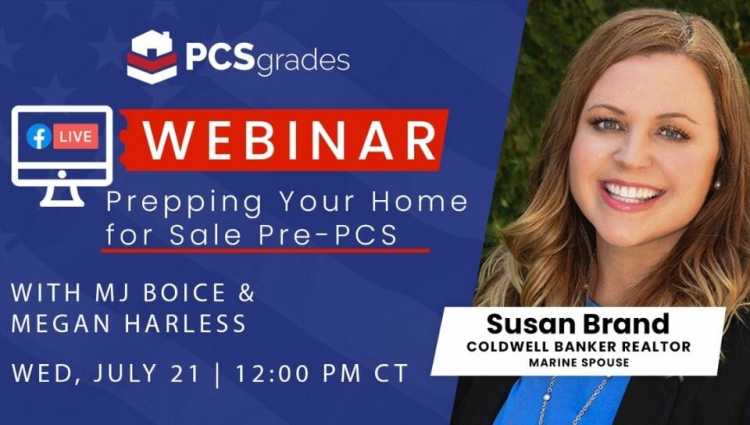Prepping and Staging Your Home Before PCS
by PCSgrades Staff - August 2nd, 2021

Guest: Susan Brand. I’ve been a Realtor for almost 8 years. Prior to that I was a teacher and I have been in sales too. I am married to a Marine Reservist with just a few years left. We married right at the end of his last PCS, so I haven’t had to go through the full PCS process yet, but I have many friends who are military spouses, and I know how hard it is.
Families are always told to stage their home before selling. What does that mean?
It sounds intimidating, but putting it simply, staging your home mostly means de-cluttering and editing. They like for you to “edit” the home. Think–less is more. You could probably remove half the items in a house. Put them in a garage or in storage, and then it’s ready for photos. You want it to look a little boring. Remove items from counters, don’t over-crown bookshelves, etc. One large piece of artwork is better than numerous small ones. The reason is because when we are looking at home photos online, our eyes get easily distracted. The less clutter, the more people can focus on the house. You are going to be moving anyway, so start packing up some things and getting ready to move. People are very forgiving about garages, because we all have one, and it’s always a mess. So put everything out in the garage.
Also be conscious of smells, especially pets. Light some candles, use air fresheners, etc. Our noses are de-sensitized to our own smells, so we want it to be fresh for potential buyers.
Are there certain repairs that need to be done before selling?
If it’s something you are concerned and thinking about, then it is probably something the potential buyer is thinking about. Think like a buyer. If there is a water-stain on the wall, people are always going to think about worst-case scenario. You don’t want to hide issues, but if you never cleaned up after something that was previously repaired, people will assume it is still an issue. It is always better to do repairs before listing and before it gets on the inspection. It may have been a quick easy fix for you, but once the buyer gets involved, it is going to cost more to get someone out there.
You can negotiate everything when selling a home. So repairs don’t necessarily stop a sale. But a repair can be written as a “conducive condition” especially for a VA Home Loan. That means the seller would have to take care of it before closing the sale. This is to protect veterans, so it’s a good thing, but it is a competitive market, so it’s best to take care of it now.
What is the open house process like? Why shouldn't you be there?
Think like the buyer. An Open House is like a home showing with a lot of people. If you are a buyer, would you feel more comfortable with the seller lurking over your shoulder, or if they weren’t there? Most people can be more free to discuss concerns when the owner is not there. It’s best to leave and let the Realtor answer the questions. It’s like the home is being “interviewed” and we want to put our best foot forward and make a good impression. We want the home to look its best, even if that isn’t the way the home normally looks. Do the dishes, put the dirty clothes away, etc.
If you have little ones, when you are showing your home, have a big box for toys where you can just throw everything in there into the garage and get their toys and things out of the way.
The pandemic has changed the way people are viewing homes. What are some of the new alternatives?
I would have never dreamt of doing a zoom call with my doctor, but we’ve all done it now. We are also shifting to real estate becoming more accepting of virtual showings. It used to be only military doing sight-unseen purchases, but it is becoming more common now. We can do Facetime, Skype, take lots of different high-def videos to record for them, so they can see things from different angles and also discuss any questions with me. Our listings used to have a limit of only 25 photos, but now they have recognized the value of getting more information out digitally, so they expanded the limit of photos we can post per listing.
What should families know when they can't visit a home in person?
It’s important to have a good real estate agent who will take the time to do those tours. I did a virtual tour yesterday and spent a lot of time in each room. I zoomed in to walls and carpets so they could see details. Don’t just do a quick walk-through, but reserve an hour so you can walk back to other rooms to compare rooms, closets, etc. Ask them to describe any smells like mold, smoke, or pets, because those are intangibles that may impact your decision. Ask them to describe how it feels with the light coming through. And it’s important to walk down the street and take some photos or videos of the neighborhood and the neighborhood entrance, the nearest grocery store, etc. This gives people as much information as possible.
On PCSgrades, people leave reviews of off-base neighborhoods, and many have descriptions and photos so you can get a better sense of your potential neighborhood. Our Area Guides talk about things like local weather, commute distances to base, and what to do in the area.
That’s why it’s so important to talk to your agent and get as many reports about the neighborhood as you can get. These are things you won’t get from a regular showing.
It’s so important to have a real estate agent who understands military life and the VA Loan process.
With the tough real estate market now, some people are waiving home inspections to have their bid accepted. How is this impacting the seller?
If you think about it from the seller’s perspective, it’s a seller’s market, so it seems like it should be easy. But there are things to consider from the seller’s perspective. Sadly, we are seeing a trend of some homes coming back on the market. What’s happening is that people are putting in multiple offers on multiple homes, so they sometimes retract an offer that has been accepted. Have your agent do some good vetting and talk to the buyer’s agent to understand more about the potential buyer and make sure their financing is solid. I typically call the lender and talk to them to make sure their situation is solid. They don’t give me personal information, just a general sense of whether they can meet their closing date.
You want someone experienced with receiving multiple offers, because the highest offer isn’t always the best.
Some people like to write a personal letter or essay to help their offer get accepted. But there has been some discussion about this, and at least one state recently outlawed it to prevent discrimination against potential buyers. It’s a common practice, but we may be moving away from that.
I recently had a VA buyer competing against seven other offers. At the last minute, I wrote a short blurb about my client PCSing from Germany and how they were excited to retire in Texas. It turned out that is what helped them get the house. That little bit of personalized information helped get their attention and helped them get the deal. If being a veteran will help you, then use it!
Many military families use the VA Home Loan to purchase a home, and this requires an inspection. How can a VA loan bid be made enticing to a seller?
I hate telling my VA buyers this, but it is tough competing against cash offers and conventional loans. We have to be creative. One thing you have to do is use the information you have and tell the sellers the buyer’s situation. Offer a shorter option period (or due diligence period). If you trim that down a few days, it may appeal to them. You can also talk to your lender about being pre-approved and get it into underwriting right away. This will speed up the process and make it much more likely that you can close on a home. I’ve talked to my VA buyers and the lender is so important. If I were competing in a multiple offers situation, I would use a local lender that I know I can text and call and they will be responsive and involved. If you’re able to put more cash towards paying the title policy for the seller (about 0.7% of the loan) that may help close the deal.
The VA will allow you to pay over the appraisal value, but you can’t put it into the contract the way you can for a conventional contract. The VA buyer can write a letter to the buyer, stating that they will pay X amount for the appraisal gap. They can provide proof of funds that they are willing to pay cash over the appraisal value. This isn’t an option for everyone, but you need to talk to your lender about that option. Just because you don’t have to put money down with the VA Home Loan doesn’t mean you can’t or shouldn’t expect to put money down. Just make sure any communication is going through your agent so it is all through appropriate channels.
What is your biggest piece of advice for military families in this crazy market?
Take a deep breath. There is a lot going on, but it is a good time to sell, and it’s also a good time to buy because the interest rates are so low. You usually can’t find the perfect house, even when you build your own! But if you can find something that meets about 85% of your interests, then it will be your home and you can be happy there. Also, there is no such thing as a stupid question for your real estate agent. Keep asking questions, even if it is something they already discussed before. Make sure you understand everything and know what to expect.
Watch the full video on our You Tube Channel here.









